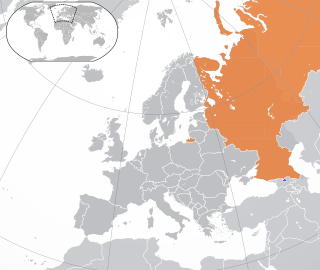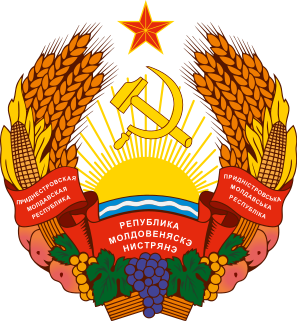Europe
 Abkhazia
Abkhazia  Russia
Russia  South Ossetia
South Ossetia - Tskhinvali (Representative office) [3]
This article lists the diplomatic missions of Transnistria. Transnistria is a state with limited recognition, that broke away from Moldova after the War of Transnistria in 1992. Transnistria did not receive recognition from any UN member states. It has been recognized as an independent state by Abkhazia, Nagorno-Karabakh and South Ossetia only. At present, Transnistria has three representative offices abroad.

The Transnistria conflict is an ongoing frozen conflict between Moldova and the unrecognized state of Transnistria. Its most active phase was the Transnistria War, which ended in a Russian-backed Transnistrian victory. There have been several attempts to resolve the conflict, although none have been successful. The conflict may be considered as having started on 2 September 1990, when Transnistria made a sovereignty declaration from Moldova.

The Community for Democracy and Rights of Nations, also commonly known as the Commonwealth of Unrecognized States, rarely as CIS-2, is an international organization uniting several states in the former Soviet Union, all of which have limited to no recognition from the international community.

The Republic of Abkhazia (Abkhazia) is a self-proclaimed state that declared soon after a catastrophic war as residual effect of Soviet Union dissolution in early 1990s, well known as Abkhazian War 1992–1993 between Abkhazian and Georgian. As the new born countries, Abkhazia struggle to gain international community recognition, but no one countries has been recognizing Abkhazia as an independent state after this war. Firstly, Transnistria recognizing each other with Abkhazia on 22 January 1993. This is the first step to Abkhazia for looking forward recognition. After a decades, on 20 September 2005, the second countries was recognizing each other with Abkhazia is South Ossetia. Third, Nagorno-Karabakh also follows two other countries to recognizing Abkhazia on 14 November 2006.

The Republic of South Ossetia – the State of Alania is a self-proclaimed state which is recognized by Russia, Nicaragua, Venezuela, Syria, Nauru, Abkhazia, Artsakh, the Donetsk People's Republic, the Luhansk People's Republic, the Sahrawi Arab Democratic Republic and Transnistria. It is considered by most member states of the United Nations to be part of Georgia, as is neighboring Abkhazia. South Ossetia declared independence from Georgia in 1991, but did not receive recognition from any UN member states until after the 2008 South Ossetia War. It, along with Russia, is the only state recognized by member states of the United Nations that recognizes the Donetsk People's Republic and the Luhansk People's Republic.

The Transnistrian republic is recognized by three states with limited recognition, and is a member of one international organization, the Community for Democracy and Human Rights, that was established by these four states.

The Assembly of Kosovo, then a province of Serbia under transitional UN administration (UNMIK), approved a declaration of independence on 17 February 2008. Kosovo was soon recognized as a sovereign state by the United States, Turkey, Albania, Austria, Germany, Italy, France, the United Kingdom, the Republic of China (Taiwan), and others. This triggered an international debate over whether Kosovo's unilateral declaration of independence had set a precedent in international law that could apply to other separatist movements, or whether it is a special case. The recognition of Kosovo's independence by 97 out of 193 UN states, according to many sources, has given fresh impetus to other separatist movements.

Abkhazia and South Ossetia are disputed territories in the Caucasus. They are both recognised as independent by Russia, Venezuela, Nicaragua, Nauru and Syria. Russia's initial recognition of the independence of Abkhazia and South Ossetia occurred in the aftermath of the Russo-Georgian War in 2008. The central government of Georgia considers the republics under military occupation by Russia.

Abkhazia–Russia relations is the bilateral relationship between the Republic of Abkhazia and the Russian Federation. Russia recognised Abkhazia on 26 August 2008, following the August 2008 Russo-Georgian War. Abkhazia and Russia established diplomatic relations on 9 September 2008.

Russia—South Ossetia relations refers to the bilateral relationship between Russia and the Republic of South Ossetia, a disputed region in the South Caucasus, located on the territory of the South Ossetian Autonomous Oblast within the former Georgian Soviet Socialist Republic.

The Milk War was a trade conflict between Russia and Belarus in June 2009. Russia and Belarus have close relations and the conflict stemmed from Russia allegedly attempting to pay Belarus US$500 million to recognize the independence of Abkhazia and South Ossetia. Russia also expressed its interest in privatizing the Belarusian milk industry. Belarus responded by seeking negotiations with the European Union on certifying Belarusian milk according to EU regulations. Russia then banned the import of dairy products from Belarus, citing alleged health concerns. The trade conflict ended on June 17, 2009, when Russia announced that it would lift the ban.

International recognition of Transnistria – a disputed region in Eastern Europe located between Moldova and Ukraine – is controversial. Although Transnistria declared independence in 1990, no United Nations member recognises its sovereignty and the region is considered by the UN to be part of Moldova. As of 2011, only Abkhazia, the Republic of Artsakh and South Ossetia recognise its independence, all themselves states with limited recognition. Despite not officially recognizing Transnistria's independence, Russia has close relations with Transnistria and even established a consulate in the territory.

Abkhazia–Transnistria relations is the bilateral relationship between the Pridnestrovian Moldovan Republic and the Republic of Abkhazia, two mostly unrecognized states in Eastern Europe. Both states recognize the independence of each other.

The Occupied territories of Georgia are the territories occupied by Russia after the Russo-Georgian War in 2008. They consist of the regions of Abkhazia (autonomous) and the former South Ossetian Autonomous Region of Soviet Georgia, whose status is a matter of international dispute.

South Ossetia–Transnistria relations is the bilateral relationship between South Ossetia and the Pridnestrovian Moldovan Republic (Transnistria). South Ossetia is recognized by five United Nations member states and Transnistria by none. The bilateral relations are mostly symbolic.

Russian-occupied territories are the lands outside of Russia's internationally recognized borders which have been designated by the United Nations and most of the international community as under a Russian military occupation. They consist of the territories of Transnistria ; Abkhazia and South Ossetia ; the Republic of Crimea, the Luhansk People's Republic and the Donetsk People's Republic ; and the Kuril Islands.